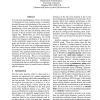6 search results - page 1 / 2 » Finding Predominant Word Senses in Untagged Text |
ACL
2004
13 years 6 months ago
2004
In word sense disambiguation (WSD), the heuristic of choosing the most common sense is extremely powerful because the distribution of the senses of a word is often skewed. The pro...
CICLING
2007
Springer
13 years 11 months ago
2007
Springer
Distributions of the senses of words are often highly skewed. This fact is exploited by word sense disambiguation (WSD) systems which back off to the predominant (most frequent) s...
AAAI
1998
13 years 6 months ago
1998
We present a corpus{based approach to word{sense disambiguation that only requires information that can be automatically extracted from untagged text. We use unsupervised techniqu...
NLDB
2005
Springer
13 years 10 months ago
2005
Springer
For most English words, dictionaries give various senses: e.g., “bank” can stand for a financial institution, shore, set, etc. Automatic selection of the sense intended in a gi...
WWW
2005
ACM
14 years 5 months ago
2005
ACM
In this paper we present the Infocious Web search engine [23]. Our goal in creating Infocious is to improve the way people find information on the Web by resolving ambiguities pre...

